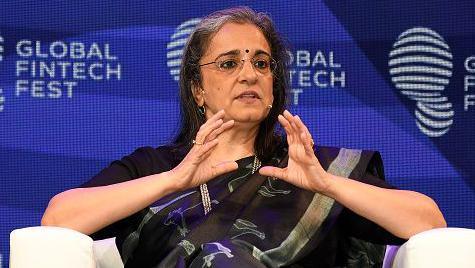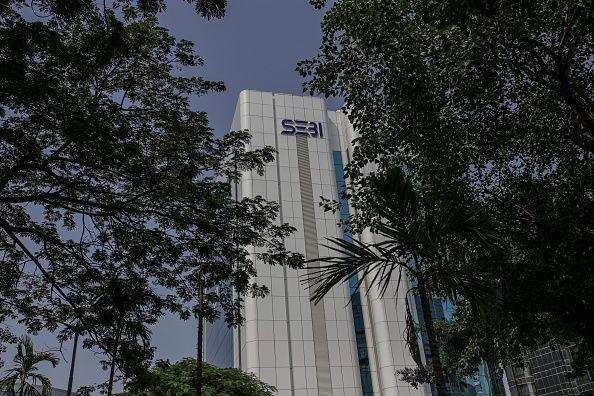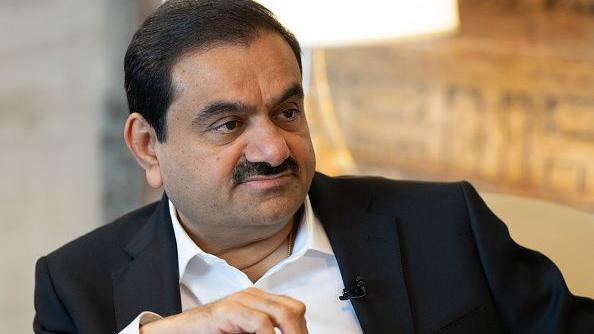Why India's market regulator is in the eye of a storm

Madhabi Puri Buch is the chairperson of the Securities and Exchange Board of India
- Published
India's stock market has been a hot topic of conversation for the past couple of days, with hashtags around it trending on social media.
The reason isn't just investor interest, but has more to do with its regulator. Let's break it down a bit.
It all started over the weekend when US-based activist-investor Hindenburg Research posted on X (formerly Twitter) that "something big" was coming.
Hours later, it released a report accusing Madhabi Puri Buch - the chief of market regulator Securities and Exchange Board of India (Sebi) - of having links with offshore funds used by the controversial Adani group. Both Ms Buch and the Adanis have denied wrongdoing.
Now, Hindenburg had last year accused the Adani group - founded by Indian billionaire Gautam Adani - of decades of "brazen" stock manipulation and accounting fraud.
The group - which has 10 publicly traded companies, operating across a wide range of sectors, including commodities trading, airports, utilities, ports and renewable energy - had strongly denied the allegations.
But the controversy took billions off its market value - it has since mostly recovered - and Sebi is still investigating the allegations.
Hindenburg now say that Ms Buch's links with the funds used by the Adanis have impacted the regulator's investigation.
Ms Buch has denied any conflict of interest and said that the investment was made before she was associated with the regulator. Also, there is no direct evidence so far linking her investment in the funds with Adani Group stocks or Sebi's investigation.
The fresh allegations wiped off $2.43bn (£1.9bn) off Adani Group's market value at the end of trading on Monday, though it made a substantial recovery from losses earlier in the day.
So what does Hindenburg say?
In its report, Hindenburg referred to earlier articles by Financial Times and the Organized Crime and Corruption Reporting Project that linked obscure offshore funds in Bermuda and Mauritius to Mr Adani's business associates.
Hindenburg alleged that Ms Buch and her husband, Dhaval Buch, invested in these sub-funds in 2015.
The firm said that weeks before Ms Buch became a whole-time member of Sebi in 2017, her husband wrote to the fund administrator, asking to be made the only person "authorised to operate the accounts".
The report says Ms Buch used her personal email ID to write to a wealth management firm to seek the redemption of her husband's entire investment in the fund.
"We suspect Sebi’s unwillingness to take meaningful action against suspect offshore shareholders in the Adani Group may stem from Chairperson Madhabi Buch’s complicity in using the exact same funds used by Vinod Adani, brother of Gautam Adani," the firm alleged.
Hindenburg also flagged Ms Buch's husband becoming an adviser in 2019 for US investment manager Blackstone, which has invested in Indian real estate investment trusts. Pointing to regulatory changes made by Sebi during Ms Buch's tenure as member and chairperson, they alleged that it directly benefitted firms like Blackstone.

The Securities and Exchange Board of India is the country's market watchdog
What is Ms Buch's response?
Ms Buch and her husband have said in a statement that the investments referred to in the Hindenburg report were made in 2015 when the couple were private citizens in Singapore, "almost two years before Madhabi joined Sebi, even as a Whole Time Member".
They said their investment was made because of Mr Buch's childhood friendship with the fund's then chief investment officer Anil Ahuja, who also "had many decades of a strong investing career".
"As confirmed by Mr Ahuja, the fund did not invest in any bond, equity or derivative of any Adani group company," their statement said.
The statement added that the market regulator had "strong institutional mechanisms of disclosure and recusal norms", which they had followed "diligently".
It called the Hindenburg report an attack on the "credibility of Sebi" and an attempt at "character assassination of its chairperson".
Regarding the allegation about Mr Buch's role with Blackstone, the couple said the investment firm was part of Ms Buch's "recusal list maintained with Sebi".
What about Sebi?
The market regulator said in a statement that it had "duly investigated" Hindenburg's allegations against the Adani Group.
It also said that its chairperson had made the required disclosures in "terms of holdings of securities and their transfers", and that she had recused herself in matters involving "potential conflicts of interest".

Gautam Adani is the world's 20th richest man
And the Adani Group?
In a statement released on its website on Sunday, the conglomerate called the allegations "a recycling of discredited claims that have been thoroughly investigated [and] proven to be baseless".
"Our overseas holding structure is fully transparent, with all relevant details disclosed regularly in numerous public documents," it said.
The group said Anil Ahuja had been a nominee director of its 3i investment fund in Adani Power in 2007-2008 and a director of Adani Enterprises until 2017.
"The Adani Group has absolutely no commercial relationship with the individuals or matters mentioned in this calculated deliberate effort to malign our standing," it added.
Hindenburg's earlier report accusing the Adanis of stock manipulation and accounting fraud 18 months back had seen their companies lose almost $150bn off their market value, though it has mostly recovered the losses since then.
In January, in a major relief to the group, India's top court rejected pleas for an additional investigation into the allegations. It also gave Sebi three months to complete its investigation - that deadline has long passed, but according to Sebi's latest statement, it has completed 23 inquiries and the last one is "close to completion".
In June, Sebi also issued a "show-cause notice" to Hindenburg Research, accusing it of violating US securities laws by colluding with an investor who made a short bet against the Adani group ahead of the report's release. Hindenburg has dismissed the allegation.
A political slugfest
Rahul Gandhi, the leader of opposition in India's parliament, said that the allegations have "gravely compromised" the "integrity" of Sebi, "which is entrusted with safeguarding the wealth of small retail investors".
His Congress party has called for a parliamentary inquiry into the accusations and has asked the government to "eliminate all conflicts of interest in the Sebi investigation of Adani".
Mr Adani is perceived as being close to Prime Minister Narendra Modi and has long faced allegations from opposition politicians that he has benefitted from his political ties, which he denies.
Mr Modi's Bharatiya Janata Party (BJP), in turn, has accused the Congress of being "involved in creating economic anarchy" and "hatred against India".
A top finance ministry official said, external on Monday that the government had "nothing to add" on the issue as both Sebi and Ms Buch had given statements.
What happens next?
In its response to Ms Buch's statement, Hindenburg has doubled down on its accusations, saying it raises "numerous new critical questions".
Sebi, Ms Buch and the Adani Group haven't reacted yet to the latest comments.
Opposition politicians are also expected to keep raising the issue - which means we haven't heard the last of it yet.